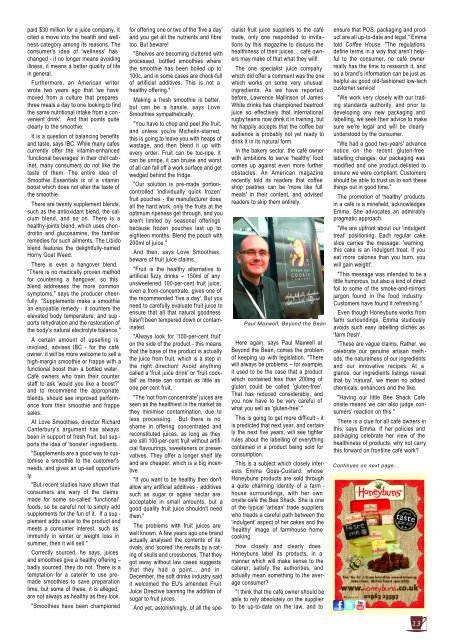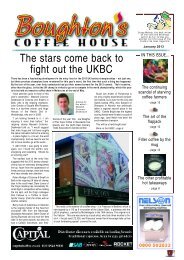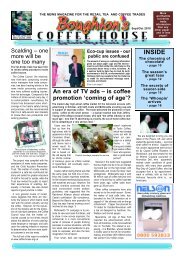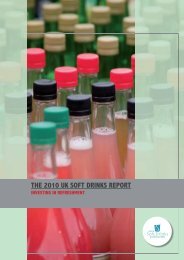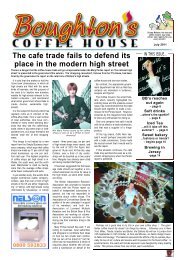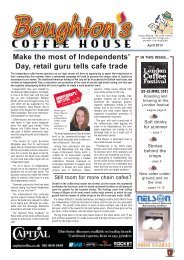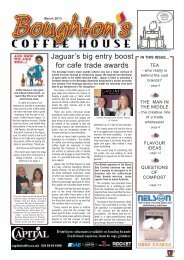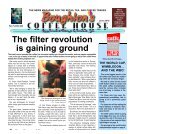British Arm Of Coffee Kids Goes Out On - Boughton's Coffee House
British Arm Of Coffee Kids Goes Out On - Boughton's Coffee House
British Arm Of Coffee Kids Goes Out On - Boughton's Coffee House
You also want an ePaper? Increase the reach of your titles
YUMPU automatically turns print PDFs into web optimized ePapers that Google loves.
paid $30 million for a juice company, it<br />
cited a move into the health and wellness<br />
category among its reasons. The<br />
consumer's idea of 'wellness' has<br />
changed - it no longer means avoiding<br />
illness, it means a better quality of life<br />
in general.<br />
Furthermore, an American writer<br />
wrote two years ago that 'we have<br />
moved from a culture that prepares<br />
three meals a day to one looking to find<br />
the same nutritional intake from a con -<br />
venient drink'. And that points quite<br />
clearly to the smoothie.<br />
It is a question of balancing benefits<br />
and taste, says IBC. While many cafes<br />
currently offer the vitamin-enhanced<br />
'functional beverages' in their chill cabinet,<br />
many consumers do not like the<br />
taste of them. The entire idea of<br />
Smoothie Essentials is of a vitamin<br />
boost which does not alter the taste of<br />
the smoothie.<br />
There are twenty supplement blends,<br />
such as the antioxidant blend, the calcium<br />
blend, and so on. There is a<br />
healthy-joints blend, which uses chon -<br />
droitin and glucosamine, the familiar<br />
remedies for such ailments. The Libido<br />
blend features the delightfully-named<br />
Horny Goat Weed.<br />
There is even a hangover blend.<br />
"There is no medically proven method<br />
for countering a hangover, so this<br />
blend addresses the more common<br />
symptoms," says the producer cheerfully.<br />
"Supplements make a smoothie<br />
an enjoyable remedy - it counters the<br />
elevated body temperature, and sup -<br />
ports rehydration and the restoration of<br />
the body's natural electrolyte balance."<br />
A certain amount of upselling is<br />
involved, advises IBC - for the café<br />
owner, it will be more welcome to sell a<br />
high-margin smoothie or frappe with a<br />
functional boost than a bottled water.<br />
Café owners who train their counter<br />
staff to ask 'would you like a boost?'<br />
and to recommend the appropriate<br />
blends, should see improved performance<br />
from their smoothie and frappe<br />
sales.<br />
At Love Smoothies, director Richard<br />
Canterbury's argument has always<br />
been in support of fresh fruit, but sup -<br />
ports the idea of 'booster' ingredients.<br />
"Supplements are a good way to customise<br />
a smoothie to the customer's<br />
needs, and gives an up-sell opportunity.<br />
"But recent studies have shown that<br />
consumers are wary of the claims<br />
made for some so-called 'functional'<br />
foods, so be careful not to simply add<br />
supplements for the fun of it. If a sup -<br />
plement adds value to the product and<br />
meets a consumer interest, such as<br />
immunity in winter or weight loss in<br />
summer, then it will sell."<br />
Correctly sourced, he says, juices<br />
and smoothies give a healthy offering –<br />
badly sourced, they do not. There is a<br />
temptation for a caterer to use premade<br />
smoothies to save preparation<br />
time, but some of these, it is alleged,<br />
are not always as healthy as they look.<br />
"Smoothies have been championed<br />
for offering one or two of the 'five a day'<br />
and you get all the nutrients and fibre<br />
too. But beware!<br />
"Shelves are becoming cluttered with<br />
processed, bottled smoothies where<br />
the smoothie has been boiled up to<br />
100c, and in some cases are chock-full<br />
of artificial additives. This is not a<br />
healthy offering."<br />
Making a fresh smoothie is better,<br />
but can be a hassle, says Love<br />
Smoothies sympathetically.<br />
"You have to chop and peel the fruit,<br />
and unless you're Michelin-starred,<br />
this is going to leave you with heaps of<br />
wastage, and then blend it up with<br />
every order. Fruit can be too-ripe, it<br />
can be unripe, it can bruise and worst<br />
of all can fall off a work surface and get<br />
wedged behind the fridge.<br />
"Our solution is pre-made portioncontrolled<br />
'individually quick frozen'<br />
fruit pouches - the manufacturer does<br />
all the hard work, only the fruits at the<br />
optimum ripeness get through, and you<br />
aren't limited by seasonal offerings<br />
because frozen pouches last up to<br />
eighteen months. Blend the pouch with<br />
200ml of juice."<br />
And then, says Love Smoothies,<br />
beware of fruit juice claims.<br />
"Fruit is the healthy alternative to<br />
artificial fizzy drinks – 150ml of any<br />
unsweetened 100-per-cent fruit juice,<br />
even a from-concentrate, gives one of<br />
the recommended 'five a day'. But you<br />
need to carefully evaluate fruit juice to<br />
ensure that all that natural goodness<br />
hasn't been tempered down or contaminated.<br />
"Always look for '100-per-cent fruit'<br />
on the side of the product - this means<br />
that the base of the product is actually<br />
the juice from fruit, which is a step in<br />
the right direction! Avoid anything<br />
called a 'fruit juice drink' or 'fruit cocktail'<br />
as these can contain as little as<br />
one per cent fruit.<br />
"The 'not from concentrate' juices are<br />
seen as the healthiest in the market as<br />
they minimise contamination, due to<br />
less processing. But there is no<br />
shame in offering concentrated and<br />
reconstituted juices, as long as they<br />
are still 100-per-cent fruit without artificial<br />
flavourings, sweeteners or preservatives.<br />
They offer a longer shelf life<br />
and are cheaper, which is a big incentive.<br />
"If you want to be healthy then don't<br />
allow any artificial additives - additives<br />
such as sugar or agave nectar are<br />
acceptable in small amounts, but a<br />
good quality fruit juice shouldn't need<br />
them."<br />
The problems with fruit juices are<br />
well known. A few years ago one brand<br />
actually analysed the contents of its<br />
rivals, and 'scored' the results by a rat -<br />
ing of skulls and crossbones. That they<br />
got away without law cases suggests<br />
that they had a point... and in<br />
December, the soft drinks industry said<br />
it welcomed the EU's amended Fruit<br />
Juice Directive banning the addition of<br />
sugar to fruit juices.<br />
And yet, astonishingly, of all the spe-<br />
cialist fruit juice suppliers to the café<br />
trade, only one responded to invita -<br />
tions by this magazine to discuss the<br />
healthiness of their juices… café owners<br />
may make of that what they will!<br />
The one specialist juice company<br />
which did offer a comment was the one<br />
which works on some very unusual<br />
ingredients. As we have reported<br />
before, Lawrence Mallinson of James<br />
White drinks has championed beetroot<br />
juice so effectively that international<br />
rugby teams now drink it in training, but<br />
he happily accepts that the coffee bar<br />
audience is probably not yet ready to<br />
drink it in its natural form.<br />
In the bakery sector, the café owner<br />
with ambitions to serve 'healthy' food<br />
comes up against even more further<br />
obstacles. An American magazine<br />
recently told its readers that coffee<br />
shop pastries can be 'more like full<br />
meals' in their content, and advised<br />
readers to skip them entirely.<br />
Paul Maxwell, Beyond the Bean<br />
Here again, says Paul Maxwell at<br />
Beyond the Bean, comes the problem<br />
of keeping up with legislation. "There<br />
will always be problems – for example,<br />
it used to be the case that a product<br />
which contained less than 200mg of<br />
gluten could be called 'gluten-free'.<br />
That has reduced considerably, and<br />
you now have to be very careful of<br />
what you sell as 'gluten-free'."<br />
This is going to get more difficult - it<br />
is predicted that next year, and certainly<br />
the next five years, will see tighter<br />
rules about the labelling of everything<br />
contained in a product being sold for<br />
consumption.<br />
This is a subject which closely interests<br />
Emma Goss-Custard, whose<br />
Honeybuns products are sold through<br />
a quite charming identity of a farm -<br />
house surroundings, with her own<br />
onsite café the Bee Shack. She is one<br />
of the typical 'artisan' trade suppliers<br />
who treads a careful path between the<br />
'indulgent' aspect of her cakes and the<br />
'healthy' image of farmhouse home<br />
cooking.<br />
How closely and clearly does<br />
Honeybuns label its products, in a<br />
manner which will make sense to the<br />
caterer, satisfy the authorities, and<br />
actually mean something to the average<br />
consumer?<br />
"I think that the café owner should be<br />
able to rely absolutely on the supplier<br />
to be up-to-date on the law, and to<br />
ensure that POS, packaging and product<br />
are all up-to-date and legal," Emma<br />
told <strong>Coffee</strong> <strong>House</strong>. "The regulations<br />
define terms in a way that aren't helpful<br />
to the consumer, no café owner<br />
really has the time to research it, and<br />
so a brand’s information can be just as<br />
helpful as good old-fashioned low-tech<br />
customer service!<br />
"We work very closely with our trading<br />
standards authority, and prior to<br />
developing any new packaging and<br />
labelling, we seek their advice to make<br />
sure we're legal and will be clearly<br />
understood by the consumer.<br />
"We had a good two-years' advance<br />
notice on the recent gluten-free<br />
labelling changes; our packaging was<br />
modified and one product delisted to<br />
ensure we were compliant. Customers<br />
should be able to trust us to sort these<br />
things out in good time."<br />
The promotion of 'healthy' products<br />
in a café is a minefield, acknowledges<br />
Emma. She advocates an admirably<br />
pragmatic approach.<br />
"We are upfront about our 'indulgent<br />
treat' positioning. Each regular cake<br />
slice carries the message: 'warning:<br />
this cake is an indulgent treat. If you<br />
eat more calories than you burn, you<br />
will gain weight'.<br />
"This message was intended to be a<br />
little humorous, but also a kind of direct<br />
foil to some of the smoke-and-mirrors<br />
jargon found in the food industry.<br />
Customers have found it refreshing."<br />
Even though Honeybuns works from<br />
farm surroundings, Emma studiously<br />
avoids such easy labelling clichés as<br />
'farm fresh'.<br />
"These are vague claims. Rather, we<br />
celebrate our genuine artisan meth -<br />
ods, the naturalness of our ingredients<br />
and our innovative recipes. At a<br />
glance, our ingredients listings reveal<br />
that by 'natural', we mean no added<br />
chemicals, enhancers and the like.<br />
"Having our little Bee Shack Cafe<br />
onsite means we can also judge consumers’<br />
reaction on this."<br />
There is a clue for all café owners in<br />
this, says Emma. If her policies and<br />
packaging celebrate her view of the<br />
healthiness of products, why not carry<br />
this forward on frontline café work?<br />
Continues on next page...<br />
13


